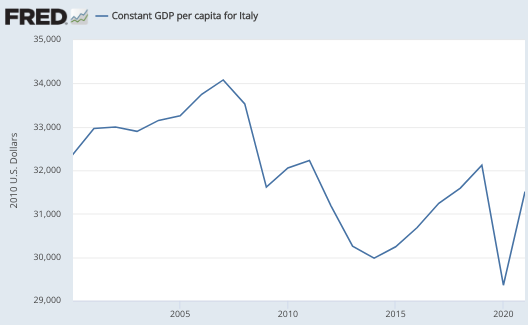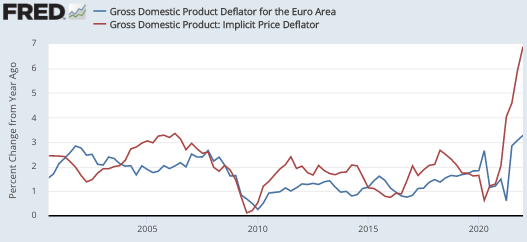Nonsensical thoughts on the hearings
I rarely watch TV (outside sports), but yesterday I watched a couple hours of the Jan. 6 hearings, which were a lot of fun. A few reactions (not to be taken seriously, and not even even consistent with each other):
1. Incredibly biased hearings:
I was stunned by how one-sided the hearings were. Yes, most of the committee members were Democrats, but two Republicans completely dominated the proceedings. And at least in the 2 hours I watched, every single person testifying was a Republican. Not one Democrat was allowed to tell their side of the story. The lopsided bias in the witness list was almost comical. Even Trump’s own family was allowed to testify.
Given the GOP bias, it wasn’t surprising that Bloomberg reported:
Plenty of Republican party actors are still solidly in Trump’s camp. The best comic relief from Thursday night’s session came from the House Republicans’ Twitter account, which declared early in the hearing, “This is all heresy.”
Well . . . it is heresy when you challenge the leader of a religious cult. Isn’t it?
2. Two types of Republicans:
The hearings made it very clear that Trump supported the violent mob that invaded the Capitol, and indeed egged them on. He encouraged the mob to go after Pence, and indeed at one point the Secret Service members defending Pence feared for their lives. But Trump just wouldn’t stop; he kept telling the mob that Pence had betrayed them.
To give you an idea as to how biased and one-sided the hearings were, not a single witness defended Trump’s support for the mob. That’s right, 100% of the witnesses, even his own family members, opposed his decision to support the mob. Many of the rioters would have defended Trump, but the committee cherry picked a few that opposed the attack on the Capitol.
The entire hearing was almost laughably one-sided. Couldn’t they call a single witness defending Trump’s actions? Instead, all we got were a series of RINOs, including much of the White House staff, left wing media figures such as Sean Hannity and traitorous family members like Ivanka and Jared and Donald Jr.
3. Lies, damned lies, and bold-faced lies:
Everyone lies. So why does Trump seem different? One exchange that caught my eye nicely encapsulates what makes Trump different from even a relatively dishonest politician like Nixon. Kevin McCarthy phoned him and asked him to call off his supporters. Trump responded that the mob were not his supporters, they were Antifa. McCarthy responded that they were in fact Trump supporters. Not missing a beat, Trump responded that it seemed like the rioters cared more about the stolen election than did McCarthy.
That kind of bold faced lie requires a certain type of arrogance. Trump knows he’s lying, and knows the other guy knows he’s lying. But Trump also knows that McCarthy will eventually kowtow to him, no matter how much Trump abuses him. He knows that McCarthy is no Liz Cheney.
Another howler was Trump’s statement of something to the effect that, “Everyone knows I won by a landslide.” A normal liar might argue that vote fraud in three states prevented Trump from a narrow victory in the electoral college. Or even that, “Most people secretly know I won by a landslide, but there might be a few deluded Democrats who actually believe Biden won.” But that’s a wimpy lie, unfit for a larger than life figure like Trump. His lies must be not just false, but utterly preposterous. Hence “Everyone knows I one by a landslide.”
4. The history books of 2050
I began to wonder what the history books of 2050 will say. There’s no doubt in my mind that the January 6 events will dominate their coverage of the Trump administration, just as Watergate dominates the Nixon period and Teapot Dome dominates the Harding coverage in history books. In all of US history, only eight times has a senator voted to convict a president of his or her own party. In all eight cases, it was Trump they voted to convict. That’s impressive!
But then when students get to the next chapter they’ll see that Trump was elected again in 2024. How will teachers explain this fact to students? American history is supposed to be a story of progress. We make mistakes, but we learn from those mistakes. So why was Trump re-elected in 2024?
5. Showtime
It had to be Liz Cheney who put together that bit that began by showing Josh Hawley pumping his fist in support of the Trump mob, and then immediately after showed him running like a frightened child through the Capitol fearing for his life.
I don’t agree with Liz Cheney’s politics, but I’d vote for her in a heartbeat. The voters of Wyoming are lucky to have such an impressive woman representing them.
PS. Here’s the FT:
Each of the committee members — seven Democrats and two Republicans — has taken the lead for a different part of the investigation. But those who have worked with it say that behind the scenes Cheney was the one making many of the most important decisions. . . .
Some of those close to Cheney believe that some of the star witnesses would not have testified had it not been for her. Bill Barr, Trump’s former attorney-general who has provided some of the committee’s most explosive testimony, served in the same cabinet as her father under president George HW Bush.
“There is no way Barr could have got away with saying no to Liz Cheney,” said Barbara Comstock, a former Republican member of Congress and longtime friend of Cheney. “The problem for a lot of these senior Republicans with Liz being there is they could run from the committee but they couldn’t hide.” . . .
Cheney has hinted that she might launch a presidential run in 2024, but experts say she is unlikely to win a Republican nomination or a general election. Instead, her main achievement might be empowering someone else to take on Trump now that he has been wounded by the committee.
“There is going to be a big field of Republicans running in 2024 thanks to the work of Liz Cheney,” said Comstock. “They should all get to their knees and thank her — although they won’t.”
Yup, this was a GOP show. The Dems cannot seem to do anything right. They are equally inept at politics and public policy.



